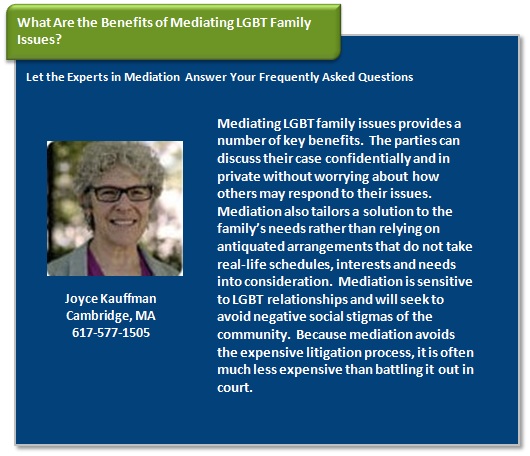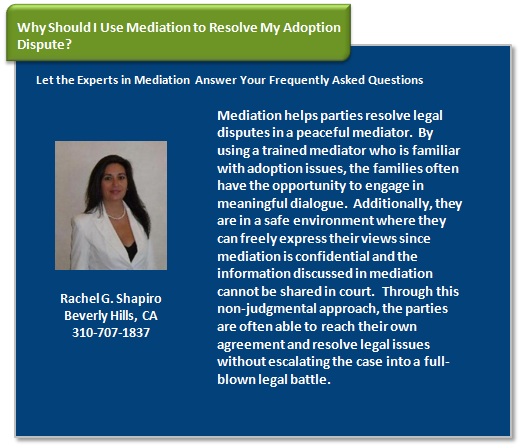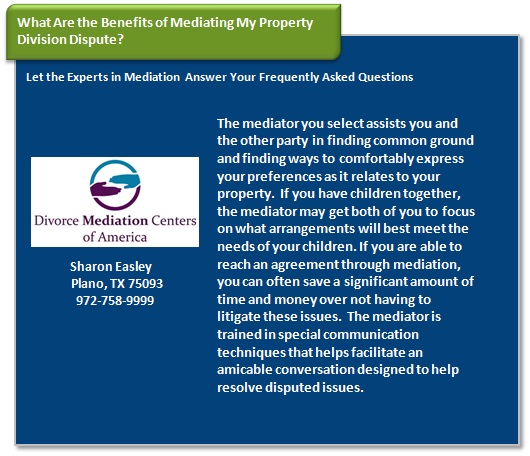
Common Family LGBT Issues Handled in Mediation
 LGBT couples face many of the same family law issues as other groups. However, the needs of LGBT individuals may be different or sensitivity may be necessary to best provide for them. Mediation allows the parties to retain their own decision-making power and avoid having to battle issues out in court. LGBT individuals may be afraid that negative social stigmas may affect the legal outcome of their case. In other situations, the law has not kept up with a changing society, providing potentially unjust results.
LGBT couples face many of the same family law issues as other groups. However, the needs of LGBT individuals may be different or sensitivity may be necessary to best provide for them. Mediation allows the parties to retain their own decision-making power and avoid having to battle issues out in court. LGBT individuals may be afraid that negative social stigmas may affect the legal outcome of their case. In other situations, the law has not kept up with a changing society, providing potentially unjust results.
Some of the most common family law issues the LGBT community faces include:
Cohabitation Agreements
Many same sex partners live together without the bond of marriage. Until recently, many states outlawed marriages between individuals of the same sex. This makes cohabitation agreements very important for the community. These agreements set out the property rights of each party and the expectations of the parties. Through respectful negotiation, the parties can often walk away from mediation with a legally-binding agreement regarding their cohabitation.
Child Custody Matters
Child custody matters are often difficult in LGBT cases because one parent may have a genetic link to a child and one may not. Additionally, LGBT individuals may wish to adopt the child of their partner who was born out of a previous relationship. Agreements may need to be established to specify the rights and duties involved of parents who are going through artificial insemination. Mediation can help clarify these issues and provide an objective method of resolving such issues.
Divorce
LGBT individuals may be at risk of unfair decisions during divorce. If their marriage has not been considered legal for long, there may be important property implications. Additionally, a same-sex spouse may find himself or herself cheated out of pension funds or retirement funds that would be divided in other situations. Mediation can develop a fair and reasonable agreement at a reasonable cost.
Using Mediation in the Adoption System
 Every year, people adopt children from around the world. Adopted children may be infants or they may be older children who have been affected by tragedy or who have not grown up in the most ideal of circumstances. For many adoptions, the biological parents may wish to maintain some contact with the child who is placed with adoptive parents. This process can sometimes add complications to the mix. Also, in some cases, older children may be interested in their roots and may want to reconnect with parents who made the difficult decision to place them for adoption.
Every year, people adopt children from around the world. Adopted children may be infants or they may be older children who have been affected by tragedy or who have not grown up in the most ideal of circumstances. For many adoptions, the biological parents may wish to maintain some contact with the child who is placed with adoptive parents. This process can sometimes add complications to the mix. Also, in some cases, older children may be interested in their roots and may want to reconnect with parents who made the difficult decision to place them for adoption.
Through open adoptions, the biological parents may be able to have some contact about the child that they placed for adoption. In some situations, the biological parents may have a legal agreement for visitation. In other cases, the biological parent may simply ask for a few pictures and updates throughout the year. In some situations, these legal agreements or understandings may be challenged, which may provide a foundation for a legal battle. Rather than battling the case out in court, some parties decide to go through the process of mediation to resolve the legal issues.
Mediation is a process led by a third-party neutral. In adoption cases, the mediator may be a former social worker, educator, lawyer or judge who is familiar with family law. The mediator talks to both parties who are in dispute and tries to understand their underlying motivations and interests. He or she can often help bridge communication gaps and suggest ways that the parties may be able to resolve their dispute without having to subject the adopted child to a nasty court battle. At the end of the process, an agreement is often reached that the parties helped to cultivate which sets out their understanding of the situation and how to proceed with their relationship.
The Changing Scope of Marijuana
 As time goes on, more individuals have come to accept marijuana as less of a hard drug and more as a product akin to cigarettes or alcohol. However, there is still a legal conflict between using marijuana and the potential illegality of this act. Some states have permitted the use of marijuana for recreational purposes while others only permit its legal use for medicinal purposes. Still other states continue to outlaw its use completely and it is still considered a drug under federal law.
As time goes on, more individuals have come to accept marijuana as less of a hard drug and more as a product akin to cigarettes or alcohol. However, there is still a legal conflict between using marijuana and the potential illegality of this act. Some states have permitted the use of marijuana for recreational purposes while others only permit its legal use for medicinal purposes. Still other states continue to outlaw its use completely and it is still considered a drug under federal law.
Due to the differing treatments of marijuana, there are several ways that people and groups may decide to handle this issue. Individuals and groups may choose to make provisions related to the use of this substance as part of rental agreements. By having clearly laid out agreements, the parties can share their viewpoints on the use of this substances, establish safe parameters and discuss penalties for any violations.
Another context where the use of this substance may come into play is in the employment context. Employers may provide specific guidelines related to the use of this substance, whether this substance will be tested during drug assessments and whether there are any restrictions as to the use of this substance. One particular concern that employers may have is whether individuals partaking in this substance may be impaired when they are driving or otherwise conducting more dangerous activities for their employers that may expose them to liability. Clear agreements that set out the employer’s expectations and policies related to the use of this substance may provide clarity in these situations.
Individuals and groups who want to negotiate agreements related to the use or prohibition of this substance may decide to do so through mediation. If they are subject to penalty, mediation or arbitration may be able to help discern whether the policies were correctly followed and applied.
Rachel Shapiro

November 28, 2016
7 ways to tell if you’re heading for divorce – Problems such as stresses brought on by circumstances (new job, moving, living somewhere too small, a new addition to the family, etc) are often fairly easy to address and work on. They are usually a blip unless they are ignored and turn into some of the bigger things below. None of the things listed mean your relationship is heading for divorce unless one, or both of you, are not prepared to work on it, either because one of you no longer wants the relationship to work, or can’t admit anything is wrong. While you are both still committed to making it work, there is always hope.
Mortgage rates increase for Monday – Several key mortgage rates floated higher today. The average rates on 30-year fixed and 15-year fixed mortgages both climbed. The average rate on 5/1 ARMs, the most popular type of variable rate mortgage, also climbed higher.
U.S. Debt – This Looming Crisis Could Ruin Many – We must deal with the debt if we are going to survive . We have two options: Simply stop spending or grow the economy. “Stop spending” is easier said than done. And boosting growth is going to be difficult too.
Sharon Easley





